 MyCatBreeds
MyCatBreeds Both Domestic Mediumhair and Bengal are originated from United States. Both Domestic Mediumhair and Bengal are having almost same weight. Domestic Mediumhair may live 4 years more than Bengal. Both Domestic Mediumhair and Bengal has same litter size. Both Domestic Mediumhair and Bengal requires Moderate maintenance.
Both Domestic Mediumhair and Bengal are originated from United States. Both Domestic Mediumhair and Bengal are having almost same weight. Domestic Mediumhair may live 4 years more than Bengal. Both Domestic Mediumhair and Bengal has same litter size. Both Domestic Mediumhair and Bengal requires Moderate maintenance.
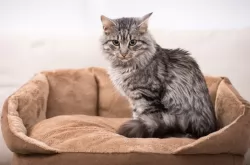 It is unclear as to whether the Domestic Mediumhair comes from Egypt, Europe or the USA.
It is unclear as to whether the Domestic Mediumhair comes from Egypt, Europe or the USA.
It is a mixed breed cat that no one can be sure how it's going to look. It is why they are often referred to as mutts and you’ll likely find them in animal shelters.
It was thought they arrived in America with the Pilgrims, who brought them aboard the ships to take care of the rodent population. Mixed breeding between many generations of cats brought about the Domestic Medium Hair.
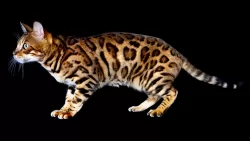 What an exquisite coat the Bengal cat has. It looks like the coat of a wild cat and can have spots, marbling, and rosettes, but it is domesticated, developed from hybrids – the spotted Egyptian Mau and the Asian Leopard cat.
What an exquisite coat the Bengal cat has. It looks like the coat of a wild cat and can have spots, marbling, and rosettes, but it is domesticated, developed from hybrids – the spotted Egyptian Mau and the Asian Leopard cat.
It is the only domestic breed of cat that has rosette markings. It is Jean Mill of California that you associate the Bengal cat with, and she conducted a number of graduate classes in genetics.
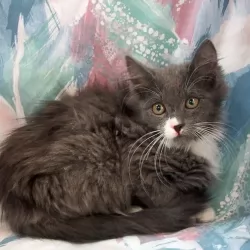 This is a medium-sized cat that weighs in the region of 3 – 6kg. They stand at about 30cm in height but there is no set standard with these cats and their looks and temperaments can vary.
This is a medium-sized cat that weighs in the region of 3 – 6kg. They stand at about 30cm in height but there is no set standard with these cats and their looks and temperaments can vary.
It's a medium built cat, not too thick-set or not too slight. The medium-length coat is thick and double-coated and can be in every color and pattern, including tabby and tortoiseshell.
The eyes can be different shades and the ears large or small too while the tail can also vary in length and bushiness.
Because the Domestic Medium Hair is of mixed ancestry, their temperaments can vary. Some are quiet and docile while other can be very energetic and have a lot to say. Most of them are loving, loyal cats that get on well with childre and other pes in the house. Some are also more independent than others, but a lot can deped on the way you bring your cat up.
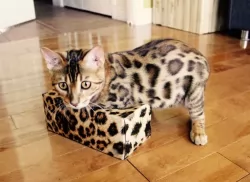 The Bengal looks like a wild cat and it can weigh up to 7kg. It can reach a height of 70cm with long, muscular legs and almond-shaped eyes which are green or blue.
The Bengal looks like a wild cat and it can weigh up to 7kg. It can reach a height of 70cm with long, muscular legs and almond-shaped eyes which are green or blue.
When it comes to the coat of the Bengal cat, it has a wide variety of colors and patterns. The cat can be brown, black, red, grey, spotted, clouded, ticked or rosette.
There are Bengal breeders that claim that their Bengals are hypoallergenic so that they won’t cause an allergic reaction with their owers. This is something that hasn’t been scientifically proved and in fact many will say that there isn’t such as thing as a hypoallergenic cat.
The Bengal is a medium to large-sized cat, being long and lean and muscular. As a low shedder, it is believed the Bengal is a hypoallergenic cat breed – a cat less likely to cause an allergy with its human owners.
When you bring a Bengal cat into your home, you’ll find they are energetic, smart, and playful and they love cavorting around in water.
People who have owned a Bengal say that the cat is friendly and that it enjoys interacting with humans. They’re cats capable of forming strong bonds with their human family, becoming affectionate and loyal. They in turn want to receive lots of loving attention.
They’re intelligent too and are quick to learn. You have to remember that these are part wild cat and that they are only classed as tame from the 4th generation (T4).
The cat has wild traits so it is only natural that it likes to hunt so don’t be alarmed when your Bengal presents you with dead mice, moles, and birds.
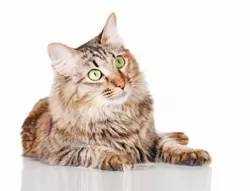 Domestic Medium Hairs come in so many different shapes, sizes and personalities. You’ll also find lots of colors, patterns and personalities with this cat as much depends on the cat’s ancestry.
Domestic Medium Hairs come in so many different shapes, sizes and personalities. You’ll also find lots of colors, patterns and personalities with this cat as much depends on the cat’s ancestry.
Even when you choose a kitten, you can’t really know what you’re going to get – large or small, lively or quiet, independent or needy – its what makes owning a Domestic Mediumhair so fascinating.
One thing every one of them has in common is that they love their human family and they deserve to all receive unconditional care and companionship.
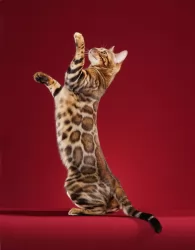 Bengal cats are intelligent and just like a dog he is clever at learning tricks and can even be taught things such as ‘sit’, ‘fetch’ or ‘lie down’. They actually make great companions as they are sensitive to their owner's moods and can even recognize human gestures and adapt their behavior to their owner's mood.
Bengal cats are intelligent and just like a dog he is clever at learning tricks and can even be taught things such as ‘sit’, ‘fetch’ or ‘lie down’. They actually make great companions as they are sensitive to their owner's moods and can even recognize human gestures and adapt their behavior to their owner's mood.
They’re vocal cats too and they like to communicate about their needs, being able to meow in different tones. They’re active cats and they want active owners – those who can spend time with them playing and even going on walks and hikes.
The Bengal certainly is a wonderfully companionable cat.
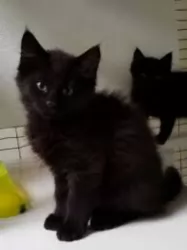 With the Domestic medium hair cat having a mixed ancestry, they are cats that don’t easily succumb to illness.
With the Domestic medium hair cat having a mixed ancestry, they are cats that don’t easily succumb to illness.
You’ll find that the health issues that are common to this cat are typically common to all cat breeds. Some of these typical illnesses are diabetes, kidney disease, obesity, dental problems and hypertrophic cardiomyopathy, a heart disease.
All these illnesses can shorten your cat's life. Gut health is of critical importance so be sure to provide your cat with a top-quality diet.
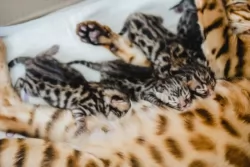 Hypertrophic cardiomyopathy (HCM) is a concern with the Bengal cat breed and this is a disease where the heart muscle becomes thick and unable to pump blood properly.
Hypertrophic cardiomyopathy (HCM) is a concern with the Bengal cat breed and this is a disease where the heart muscle becomes thick and unable to pump blood properly.
It’s a common genetic disease in Bengal cats. Cats used for breeding need to be screened each year to ensure no hypertrophic cardiomyopathy is present.
Another problem with the Bengal cat is Progressive retinal atrophy or PRA. Anyone wanting to breed Bengals should have their cat tested for this eye disease as the disease can lead to blindness.
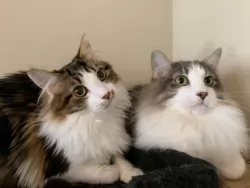 The Domestic Medium Hair has a thick, double coat, and to avoid hairballs and matting, he will need to be brushed at least once a week. Set aside this brushing time to examine your cat’s eyes, the inside of his ears, inside his mouth for bad teeth, to check the length of his claws and to feel for unusual new lumps.
The Domestic Medium Hair has a thick, double coat, and to avoid hairballs and matting, he will need to be brushed at least once a week. Set aside this brushing time to examine your cat’s eyes, the inside of his ears, inside his mouth for bad teeth, to check the length of his claws and to feel for unusual new lumps.
Your cat's diet is as important as life itself. Your cat is a carnivore and should be fed meat. He won’t do well on carbs. Speak to your vet if you’re unsure about how to feed your cat.
Meanwhile, there are some excellent commercially manufactured cat foods on the market and if you choose the best ones with meat at the top of the ingredients list, you can be doing the right thing.
Kittens start with 4 meals a day while the older cat will do well on 2 meals a day. It is most important to feed your kitten the very best food – the correct diet – because their bones, brain, coat and energy all depend on this for the rest of their lives.
Remember too that there are cat foods that cater to the different seasons of your cats life. A kitten, young adult, energetic breed, pregnant cat, a cat with disease, and a senior cat will all have a choice of foods made by the top brand cat food manufacturers. Each food caters specifically for the cat’s unique needs.
Keep your cat's vaccines and de-worming up to date. Parasites left unchecked can make your cat sick.
You can provide your cat with all the best food, toys, comfy bedding and medical care you like, but if you don’t provide him with love and attention, it will all be in vain.
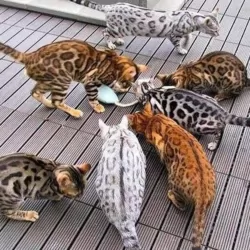 You will need a secured outdoor area for your Bengal cat where he can play and climb. He will need these for his activity levels as well as stimulating toys.
You will need a secured outdoor area for your Bengal cat where he can play and climb. He will need these for his activity levels as well as stimulating toys.
Provide feeding and water bowls and also make sure that you provide your Bengal with a shallow swimming pool as this cat loves water.
The Bengal is a healthy cat breed so it is important to provide your pet cat with the best food there is and to ensure he gets checked out at the vet every year.
Most hybrid breed owners provide raw food as these cats are often sensitive to commercially manufactured food. Having said that, there are high-quality prepared cat foods that will provide your Bengal with everything needed for a healthy life.
Look at providing your pet with a good supplement to ensure your furry friend has every chance to be healthy and happy.